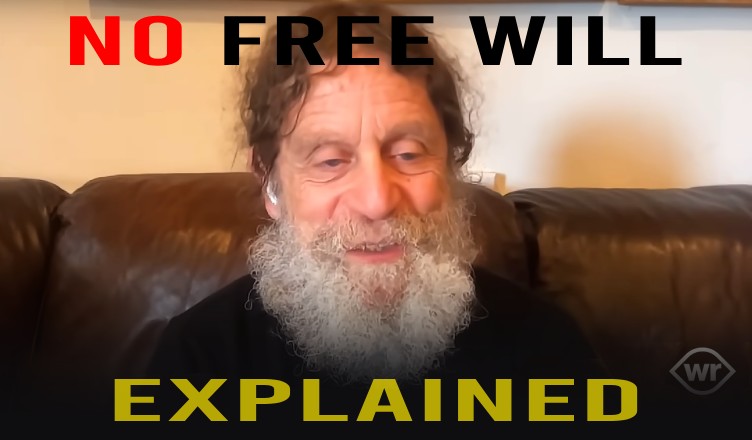Determinism—or the no free will argument—is the view that free will is an illusion because every thought, action, and decision is shaped entirely by prior causes. Our choices are dictated by biology, environment, and past experiences, leaving no room for true independent decision-making.
While I sort of agree with the no free will argument, in theory—or at least acknowledge that most evidence in neuroscience, psychology, and physics supports it—like most people, I struggle to truly accept that I have no real agency over my decisions.
But I was just watching an interview with the great Robert Sapolsky, (renowned Stanford neuroscientist, evolutionary biologist, and author), on Alex O’Connor’s youtube, where he gave one of the most coherent explanations of the no free will argument that finally made sense to me! So I wanted to share it how he explained it. What follows are Sapolsky’s words, not mine!
When somebody does some behavior, we ask, why did they do that? Where did that come from? Why did that just occur? And what is scientifically clear to me by now is that’s a whole hierarchy of questions.
‘Why did that occur?‘—you’re asking which parts of the brain did or didn’t do something in the last half second, but you’re also asking something about the sensory stimuli for that individual in the prior minutes—Were they terrified? Were they stressed? Were they aroused? Were they hungry, sleepy, whatever?And you’re also asking, ‘What about your hormone levels this morning?’ because that’s going to influence how sensitive your brain was to various environmental stimuli. What were your last years like in terms of trauma, finding love, finding God—whatever? Because as the backbone of this whole field of neuroplasticity, you will get major changes in brain function and structure in response to experiences like that.
And then you’re off to your usual suspects—adolescence, childhood, fetal life, your genes. Amazingly, you also have to consider what kind of culture your ancestors came from—what kind of ecosystems they were living in—because that had a ton to do with it. Because within minutes of birth, the culture in which your mother was raised will influence her mothering style.
So, why did that person just do what they did? Because of everything from one second ago to millennia ago—all of these influences.
When you look at the amount of our behavior that all of those prior events encompass, what you conclude is we are nothing more than the sum of our biological luck, (over which we had no control), and its interactions with the sum of our environmental luck, (which we also had no control over).And it’s not like you’ve got to keep in mind a whole bunch of different scientific disciplines, because maybe neuroscience doesn’t disprove free will, but endocrinology does, or genetics doesn’t but physiological ecology or—No, the key point is that all of these different disciplinary approaches turn into the same thing.
What do I mean by that?You’re talking about genes and behavior. If you’re doing that, by definition, you’re talking about millions of years of evolution of your genes. And you’re also talking about what your childhood was like, when experiences then were causing lifelong epigenetic changes in your gene regulation. And you’re also talking about what proteins your brain was making under direction of your genes 25 minutes ago. And when you look at how it forms one continuous arc of influences, my two cents is there’s not a crack anywhere in that edifice in which you could shoehorn in free will.






